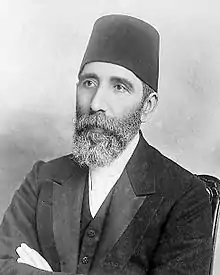Hüseyin Hilmi Pacha
Hüseyin Hilmi Pasha (, Lesbos — 1922, Vienne) est un homme d’État et deux fois grand vizir[2] de l'Empire ottoman au début de la Seconde Ère Constitutionnelle. Il est aussi le fondateur du Croissant-Rouge ottoman[3]. Hüseyin Hilmi est l'un des meilleurs administrateurs des Balkans au début du XXe siècle en tant qu'inspecteur général ottoman de Macédoine[4] de 1902 à 1908. Il occupe les fonctions de ministre de l'Intérieur[5] de 1908 à 1909 et d'ambassadeur ottoman à Vienne[6] de 1912 à 1918.
| Hüseyin Hilmi Pasha | |
 Hüseyin Hilmi Pasha | |
| Fonctions | |
|---|---|
| Inspecteur-Général de Macédoine | |
| – | |
| Grand vizir de l'Empire ottoman | |
| – | |
| Président | Abdülhamid II |
| Prédécesseur | Kıbrısli Mehmet Sait Pasha |
| Successeur | Ahmet Tevfik Pacha |
| Grand vizir de l'Empire ottoman | |
| – | |
| Président | Mehmed V |
| Prédécesseur | Ahmet Tevfik Pacha |
| Successeur | İbrahim Hakkı Pasha |
| Ministre de l'Intérieur de l'Empire ottoman | |
| – | |
| Ambassadeur Ottoman à Vienne | |
| – | |
| Biographie | |
| Date de naissance | |
| Lieu de naissance | Lesbos, Grèce, Empire ottoman |
| Date de décès | |
| Lieu de décès | Vienne, Autriche |
| Nationalité | ottomane[1] |
| Religion | Islam |
Biographie
Hüseyin Hilmi Pasha nait en 1855 à Lesbos (Midilli) dans une famille d'origine grecque[1],[7],[8],[9] convertie à l'Islam[10]. Il fait le début de sa scolarité à Lesbos où il acquiert un bon niveau de français. Il débute comme clerc dans l'administration ottomane et grimpe rapidement les échelons de la hiérarchie. Il devient gouverneur d'Adana en 1897 et du Yémen en 1902. Il est nommé la même année inspecteur-général avec des responsabilités sur tous les territoires ottomans des Balkans, c'est-à-dire les vilayets de Salonique, du Kosovo et de Manastir (Bitola).
Après la révision de la constitution ottomane en 1908, il est nommé au poste de ministre de l'Intérieur. Il devient Grand Vizir du au sous le règne d'Abdülhamid II. Hüseyin Hilmi Pasha est le dernier Grand Vizir d'Abdülhamid II. Il doit quitter ce poste lors de l'incident du 31 mars où, durant un mois, les fondamentalistes tiennent les rues d'Istanbul jusqu'à l'arrivée de l'armée de Salonique. Il redevient Grand Vizir du au .
Il succède à Gazi Ahmed Muhtar Pasha au poste de ministre de la Justice. Il est nommé ambassadeur ottoman à Vienne en Autriche-Hongrie en , poste qu'il occupe jusqu'à la fin de la Première Guerre mondiale.
À cause de problèmes de santé, il reste à Vienne jusqu'à sa mort en 1922. Il est enterré à Beşiktaş, Istanbul.
Notes et références
- (en) Cet article est partiellement ou en totalité issu de l’article de Wikipédia en anglais intitulé « Hüseyin Hilmi Pasha » (voir la liste des auteurs).
- (en) Prothero, George Walter, Peace Handbooks : The Balkan states, H. M. Stationery Office, (OCLC 4694680), p. 45
« Hussein Hilmi Pasha, descended from a Greek convert to Islam in the island of Mitylene, was sent to Macedonia as High Commissioner. »
- Archivum ottomanicum v. 23, Mouton, , p. 272
« Hüseyin Hilmi (1855-1923), who was to become Grand Vezir twice in 1909 »
- (en) Trivedi, Raj Kumar, The critical triangle : India, Britain, and Turkey, 1908-1924, Publication Scheme, (OCLC 31173524), p. 77
« the Ottoman Red Crescent Society of which Hilmi Pasha was the head, which he said, utilized their money for the purpose for which it had been contributed by Muslims in India. »
- (en) Kent, Marian, The Great Powers and the End of the Ottoman Empire, Routledge, , 2e éd., poche (ISBN 978-0-7146-4154-6, LCCN 95021912), p. 227
« Hüseyin Hilmi Pasha (1855-1923) (Ottoman Inspector-General of Macedonia, 1902-8 »
- (en) Kent, Marian, The Great Powers and the End of the Ottoman Empire, Routledge, , 2e éd., poche (ISBN 978-0-7146-4154-6, LCCN 95021912), p. 227
« Hüseyin Hilmi Pasha (1855-1923) Minister for the Interior, 1908-9) »
- (en) Kent, Marian, The Great Powers and the End of the Ottoman Empire, Routledge, , 2e éd., poche (ISBN 978-0-7146-4154-6, LCCN 95021912), p. 227
« Hüseyin Hilmi Pasha (1855-1923) Ambassador to Vienna, 1912-18 »
- (en) Edward J Wheeler (éditeur), Current Literature, Current Literature Pub. Co, (OCLC 4604506), p. 389
« His Excellency Hussein Hilmi Pacha is a Turk "of the isles." The politest Turks of all come from the isles. There is also Greek blood in his veins, »
- (en) Great Britain. Foreign Office. Historical Section, Handbooks prepared under the direction of the Historical section of the foreign office, H.M. Stationery off., (OCLC 27784113), p. 45
« Hussein Hilmi Pasha, descended from a Greek convert to Islam in the island of Mitylene, was sent to Macedonia as High Commissioner. »
- (en) George Frederick Abbott, Turkey in transition, E. Arnold, (OCLC 2355821), p. 149
« For Hilmi is a novus homo. A native of Mytilene, of obscure origin, partly Greek, he began his career as secretary to Kemal Bey »
- (en) George Walter Prothero, Peace Handbooks : The Balkan states, H. M. Stationery Office, (OCLC 4694680), p. 45
« Hussein Hilmi Pasha, descended from a Greek convert to Islam in the island of Mitylene. »
Sources
- (en) Emine Onhan Evered, "An educational prescription for the Sultan: Huseyin hilmi pasa's advice for the maladies of empire," Middle Eastern Studies, 43,3 (2007), 439-459.
Voir aussi
Liens externes
- Portail de l’Empire ottoman
- Portail de la Turquie
- Portail de la politique